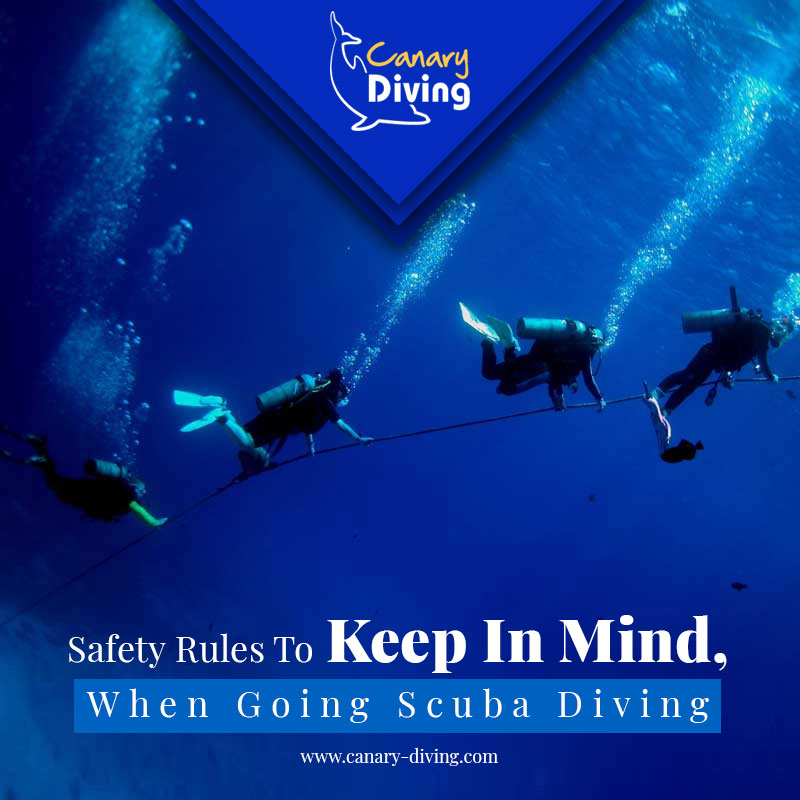Risks are a part of every sport and scuba diving is no exception. It’s the very part, which makes it more challenging and causes an adrenaline rush in certified divers. Given the unpredictability involved, every entry-level diver must master the tactics of overcoming the potential threats underwater, be it an encounter with a shark or a lung injury.
There are many certification courses, like the PADI Open Water Course offered at Canary Diving Adventures, one of the leading diving schools in Gran Canaria, instructing divers on the fundamentals of diving and preparing them for a thrilling scuba diving in Gran Canaria itself. Despite so, it’s entirely up to a diving enthusiast to bear them in mind and apply them at the opportune time. But, let’s not drag it any further, rather go straight into the rules minimizing chances of encountering a diving accident.
#1 Never hold your breath
Injuries like Lung over expansion injuries are not that common but are still a series hazard when scuba diving. As long as you make sure you are always breathing in or out there is no problem. We always want to make sure we NEVER ever hold our breath, especially when ascending from the water. As well as this practicing good steady breathing will help a lot with controlling buoyancy.
#2 Scrutinise Gear Defects Before a Dive & Learn To Use It
Always remember that equipment and gear are your safety kits and lifeline underwater. So, to avert a potentially dangerous situation, always check anything you or your buddy will use before during and after a dive (Buddy checks). Moreover, don’t just accept a dive centers word for it, if you are not comfortable with the state of the equipment don’t use it! . DSMB, dump valves and integrated weights are things to take note of as well.
#3 Chalk Out a Plan Before Diving
Scuba diving is a thrilling, adventurous and safe activity, but only too those who respect and follow the safety rules. One of them is to plan well in advance, discussing depth, time, hand signals, limitations for you or your buddy and other specifics with your buddy. Always check your pressure gauge once every few minutes, when going for a deeper dive make sure to check it more regularly. The most common cause of diver injury and accidents are because of diver error, not running out of air or faulty equipment.
#4 Know Your Limits
It’s best to plan your scuba diving location and depth based on your certification, conditions and you and your buddy’s training. Recklessness or arrogance when planning dives is extremely risky. Take note of a few factors like temperature fluctuation, current and surface conditions before going for scuba diving and never go past your training, always staying within your limits.
#5 Maintain a Standard Fitness Level
Even though scuba diving is one of the most relaxing chilled out activities to do, it still does require a certain level of fitness. Just like all humans on the planet we need to make sure we keep our self in good health. Try to avoid heavy smoking especially before or after diving. If needed, book an appointment with your physician to diagnose pre-existing diseases or to your local doctor for a fit too dive medical. The big Health concerns in the scuba diving world are Heart problems, epilepsy and pregnancy.
#6 Ensure Ascent At a Rate of no Faster then 18meters a minute
In simple words, maintain a steady slow consistent speed when ascending to avert decompression sickness. Stop for 3-minutes at 5meters/15-feet and do not forget to deflate BCD before starting the ascent, and always have that finger on the deflate button just incase your ascent starts to get away from you. If you don’t have a computer to judge the speed, a good rule is to go no faster then your smallest bubble.
#7 Be Aware Of The Rule Of Thirds
The rule of thirds states that for a safe dive, a diver should preserve a third of air supply for covering the outward journey, another third for covering the return journey and the rest for safety purpose. It’s a good practice when the entry and exit points are different.
#8 Get Yourself a Dive Buddy
We never want to dive on our own. Emergencies are better tackled with the help of a dive buddy. As well as it being much safer to dive with a buddy, guess what its also a lot more fun, swapping stories and sharing memories together.


